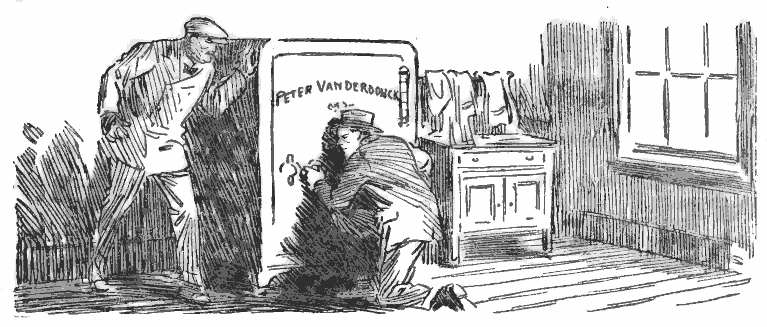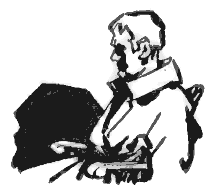Missing men
Vincent Starrett

MISSING MEN
WHEN AN IMPORTANT BROKER AND AN EMINENT ACTOR MYSTERIOUSLY AND SIMULTANEOUSLY VANISHED, IT HAD THE POLICE WORRIED. WHEN ON TOP OF THAT THE BEAUTIFUL DAUGHTER OF A RETIRED BUSINESS MAN HYSTERICALLY REPORTED HER FATHER GONE WITHOUT A TRACE, IT BECAME A MATTER FOR THE FAMOUS DETECTIVE LAVENDER HIMSELF.
My friend Lavender dwelt up four flights of steps, a wearisome climb unless one were in training. Only the little landings at the end of every flight kept me from perishing of thirst and fatigue on more than one ascent. So at least I told Lavender. The journey offered no difficulties to that agile young man himself. The trouble with me was that I inclined toward—well, stoutness.
“The rooms are comfortable,” he would reply to my protests, “the windows afford an excellent view of an interesting corner of town, and the stairs are at once a protection and a blessing. The exercise I get in going up and down is distinctly beneficial, while four flights are sufficiently formidable to daunt bores and any but very determined clients and friends. Thus my practice is kept within reasonable bounds, my bank account is not the envy of the criminal class, and my circle of intimates does not overflow the social space at my disposal. Besides, the rooms are cheap.”
The really important thing about Lavender’s rooms was their convenience to transportation. Overlooking a minor business section, not too far from the Chicago Loop to be remote, the windows fronted north and west and beneath them to the north actually lay an elevated railroad station.
And Morley of the Central Detail, who patronized the “L,” never found the place too far nor the steps too numerous. He was a clever young detective sergeant of the regular force, who occasionally visited Lavender—clever chiefly in that he had sense enough to come to Lavender when he was in difficulties. One morning he came up the steps in an unusually bad humor, and that is part of the story I have to tell.
I had spent the night with Lavender and we had just finished breakfast, sent up by the restaurateur on the corner, when we heard Morley’s footsteps and shortly beheld his morose countenance. He gave me a patronizing nod and shook hands warmly with Lavender.
We listened to his tale of woe. It seemed this time that one Peter Vanderdonck, a picture broker of some importance, had disappeared and that Morley was at his wit’s end.
“Usually,” said he, “there’s some sort of a clue, but in this case there isn’t any thing that resembles one. I can’t get started without a clue of some kind,” he grumbled with pathetic profanity.
“Who reported him missing?” asked Lavender.
“His damn landlord,” said Morley. “This Vanderdonck didn’t send a check for his rent or something like that, so the guy—name’s Giles—sends for the police. Thinks we’re bill collectors, I guess. Damn silly in my opinion. Vanderdonck’s probably just gone out of town and forgotten his rent.”
Lavender grinned. “Is the usual ‘foul play’ suspected?”
“By the landlord and the newspapers, sure!” replied Morley with heavy irony. “There’s nothing to indicate it. I’ve been through his office. No signs of a struggle. Nothing! Just as he must have left it. Not a thing moved. He might never even have used it, for all the evidence.”
“Well,” smiled Lavender, “murder doesn’t always occur in a man’s office. It’s conceivable that a man may be killed in the street or in his home.”
“Sure,” agreed the detective. “I ain’t a fool. But where do I start when there ain’t a clue? Nobody seems to know Vanderdonck but this Giles person, and nobody seems to know where he lives or whether he’s got relatives or when he was last seen. It’s just a blank wall,” he ended, with more profanity.
“A blankety-blank wall, evidently,” observed Lavender. “Well, Morley, I don’t know what you expect me to do. I can’t reach into my vest pocket and pull out the missing man. Wish I could! I’m going down town this afternoon though, and I’ll look over this fellow’s rooms with you if that’s what you want. Give me the address, and let’s say two o’clock.”
He smiled and picked up a morning newspaper.
“By the way, Morley,” he continued, “I hope an epidemic of disappearances is not about to begin. There are two others recorded in this morning’s paper, and your case makes three.”
Morley looked suspicious, as though he thought his leg was being pulled.
“I didn’t notice ’em,” he admitted.
“Charles Merritt is one of them. Know him? Rather well known and popular comedian. He was playing in the ‘Tinfoil Revue.’ He didn’t show up at the theatre a few nights ago, or at least, nobody seems to have seen him. And nobody missed him until his first cue, which seems strange. When he didn’t respond, of course everybody missed him. He wasn’t to be found and there was some excitement before the difficulty could be straightened out. Eventually they went ahead without him. The case is several days old but the press has just got hold of it. The theatre tried to keep it quiet. A queer case, don’t you think?”
“Drunk!” declared Morley without hesitation. “Who’s the other fellow?”
“It’s not a fellow, it’s a woman,” replied Lavender. “A Mrs.—Mrs.—” he referred to the paper—“Mrs. Jameson of Rogers Park. Nice little suburban widow. She went shopping yesterday morning and didn’t come home.”
“In a hospital somewhere,” asserted Morley promptly. “Run down, unconscious, and can’t tell who she is. She’ll be found before night.”
Lavender sighed whimsically.
“It’s uncanny the way you solve these mysteries, Morley,” he said. “I wish I could do it in twice the time! Well, well, I’m not trying to suggest that there is any connection between your case and these others. I’ll see you at two.”
He cocked an eye at me when our visitor had departed.
“The worst of it is, Lavender,” I said, “he’s probably right about one or both of those cases. One case does resemble another very closely, for the most part, and the obvious solution is often enough the correct one as you yourself told me.”
“True,” agreed my friend. “He may even be right about his own case. This Vanderdonck may have gone out of town very innocently, as Morley suggests. It’s because it is so nearly always the expected that happens, in spite of the old maxim, that the police are on the whole a successful body of men. But, hello! Who’s this?”
There had interrupted him a long ring at the doorbell.
“I hope, speaking of epidemics, that an epidemic of visitors is not about to begin,” he continued. “No heavy steps this time, Gilruth, nor do they come two at a time. Light—rapid, but light. Chuck the dishes out of sight like a good fellow, Gilly. We are about to receive a woman.”
“I have a feeling,” said I, “that we are going to hear about another mysterious disappearance.”
Lavender looked interested.
“The deuce you have! Do you know, Gilly, I also had one for a moment. But it is really too much to expect, right on the heels of Sergeant Morley.”
The lady’s knock fell upon the door panel.
“Nevertheless,” whispered Lavender, “I am sure you are right.”
He opened the door, and there entered Miss Shirley Minor.
Of course, we did not know her by sight or by instinct. We learned her name from her own lips some seconds after her appearance. We knew only in that first glance that an extraordinarily lovely young woman stood on the doorsill. Small, dark, alert. Her eyes, blue and anxious, looked from one to the other of us and settled upon Lavender. A little smile at once eager and wistful played about her lips.
Then she said, “I am Shirley Minor. May I come in?”
The name meant nothing in the world to either of us but we smiled in unison, like a vaudeville duo.
“Of course,” said Lavender, and I think I added, “Please do!”
“You had a visitor,” she said, “so I waited until he had gone.”
We seated her near the window where she at once exploded her bombshell. It was not quite unexpected.
“Mr. Lavender,” she said piteously, “my father has disappeared!”
I looked at Lavender. He was looking at Shirley Minor. He was not in the least surprised nor excited. He merely smiled encouragingly at the girl.
“Yes?” he said. “And of course you want me to assist you to find him. I shall be happy to aid, of course. Just take a fresh grip on your nerves, Miss Minor, and tell us all about it. It is our business to help.”
His calm interest and his cheerful smile had the desired effect. The anxiety faded from her eyes, and in a moment she smiled back at him.
“I’m afraid you will think me foolish, for after all father may have disappeared in a very usual manner. I mean, he may have gone away for a little while without bothering to leave word. Just the same I am anxious. You see, I have been away for some time myself. Only yesterday I returned from New York where I have been for some months. Father is hardly a notable correspondent, but I did hear from him once in a while, just a note to say that he was well. He always hated to write letters. I wrote reams to him, of course. Yesterday when I returned I found my three last letters to him in the mailbox. Apparently he hadn’t been home to receive them. And I hadn’t heard from him before I left New York for nearly two weeks.”
“Was he expecting you to return?” asked Lavender, still cheerful.
“No, he wasn’t,” admitted Miss Minor with an air of guilt. “You see, I was somewhat anxious about not hearing from father, but not actively alarmed. I supposed that he didn’t feel like writing. But in the background of my thought there was a slight fear that perhaps he was ill. I knew that if I wired that I was coming home and he was ill, he would wire back to stop me. That’s his way, he doesn’t like to be fussed over. So as I was tired of New York anyway I just thought I’d come home and surprise him.”

“When did he expect you to return?”
“Well, not for another month at least, I’m afraid.”
“And your mother——?”
“My mother is dead,” said Miss Minor.
“I see! Your father, I fancy, is Cyril Minor? I thought so. Well, Miss Minor, you are probably alarming yourself about nothing in particular. Inasmuch as he did not expect you to return there was no reason why he should not leave town for a while, if it occurred to him. Still you probably did well to come to me. If anything has happened it is well to know about it early, isn’t it? You have no idea where he might have gone, supposing him to have left town for a visit?”
“None in the world. His interests were all in Chicago, in recent years anyway; in his home and his club. Except for an old aunt up in Canada I don’t believe he has a relative in the world, other than I.”
“Most men have friends,” said Lavender, “and if I remember your father’s reputation, he had no enemies. You haven’t been to the police, I suppose?”
Miss Minor had not.
“Good,” nodded Lavender. “Don’t bother them just now. Leave the matter in my hands for a time. Probably you’ll hear from your father when your mail is forwarded from New York, but in any case don’t worry. Now tell me something of your father’s habits.”